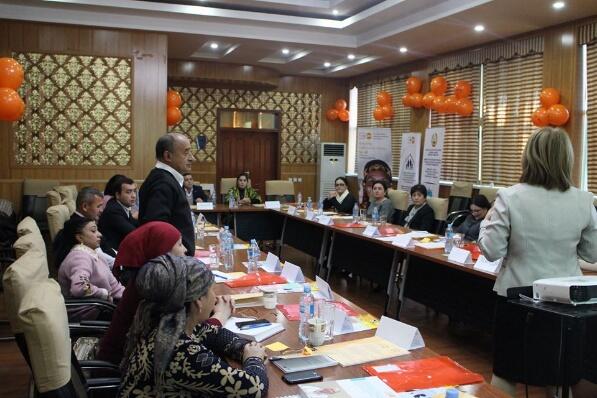Standard operating procedures adopted in Tajikistan are being used to better address GBV during the Covid-19 pandemic
Past evidence and initial trends suggest that the COVID-19 pandemic may have already - and will likely continue to - exacerbate incidents of gender based-violence (GBV) particularly for women and girls. Already high levels of violence against women in Tajikistan are being compounded by border closures, job and income losses, which are exacerbating individual, family and societal stresses. Global research indicates that these factors are challenging the ability of women to temporarily escape abusive partners, access emergency and life-saving services and increase their risk to violence due to increased societal stress. Moreover, global data is pointing to the rising risks of violence against health care workers during pandemics, noting the already high levels of harassment and violence that female health workers face.
Access to quality essential health services for survivors of GBV is lacking in Tajikistan. This is due to a lack of a strong multi-sectoral approach and a survivor-based approach, which prioritises safety, is sensitive to survivors and is linked with other sectors through referral and coordination. Secondly, standard operating procedures (SOPs), guidelines and protocols to address GBV are largely missing. Where procedures do exist there are gaps in implementation and capacity among first line service providers. Best practices and models SOPs, which provide clear and detailed descriptions of routine actions of health care providers, police, and psycho-social services to ensure quality and consistency of service provision exist globally but they need to be adapted, adopted and operationalised at the local level.

Pre-existing and active Interventions under UK Government Programme funding:
In order to address some of these challenges, UNFPA Tajikistan provided technical support to the Ministry of Health and Social Protection of the Republic of Tajikistan (MoHSP RT) to adapt SOPs for the provision of psycho-social support services to victims and survivors of GBV. Such support was provided through the UK Government Programme funding-CSSF GBV project for Central Asia implemented by UNFPA from June 2019. Social services comprise a range of services that are critical in supporting the rights, safety and wellbeing of women and girls experiencing violence including crisis information and help lines, safe accommodation, legal and rights information and advice.
Two sets of SOPs were reviewed, adapted and adopted in 2019 in Tajikistan with support from the UK Government Programme funding: One on psycho-social support and one on police services. These were reviewed by experts including doctors, midwives and obstetrician-gynecologists and subsequently approved by the MoHSP and the Ministry of Internal Affairs at the end of 2019 respectively. Furthermore, a training module was developed, based on which workshops by MOHSP were carried out in November and December 2019 for staff from the health care and law enforcement agencies to build their capacities to provide psycho-social support to victims and survivors of gender-based violence.
COVID-19 Secondary impacts on GBV issues and UK Government Programme funding’s response:
With the COVID-19 pandemic spreading around the world, when movement is restricted and protection systems are weakened, women and girls are at greater risk of experiencing GBV. There is now a greater need for prevention, risk mitigation and response services, at the time when these services are reduced as resources are diverted to respond to the overall health crisis. Continued technical support is now vital to ensure that there is national capacity for GBV prevention and clinical management care in such emergency as COVID-19.
Building on the work carried out in 2019 through the UK Government Programme funding, the MoHSPP approached UNFPA with a request to build the capacity of medical personnel in primary health care facilities in Dushanbe to provide quality psychosocial supports to survivors of GBV, including rape. The purpose is to strengthen the role of the healthcare system in responding to gender-based violence, in particular provision of psychosocial and medical services as part of an interagency response to gender-based violence, medical assistance for survivors of rape, including in emergency situations (COVID-19).
Having SOP on psycho-social support already adopted in 2019 as part of the UK Government Programme funding was instrumental and is enabling UNFPA to train medical specialists and equip them with skills and knowledge on routine actions to be taken for provision of face-to-face counseling services to patients who experienced GBV.
Having SOPs in place also help to effectively identify victims and survivors of gender-based violence, increase their safety and security at all intervention stages, improve and align GBV related documentation, facilitate data collection, promote effective referral system and provide quality psycho-social support.
The synergy of health care and law enforcement structures which was strengthened through the adoption of the SOPs for each sector contributed to interagency cooperation and helped improve measures on prevention and response to gender-based violence in Tajikistan.


